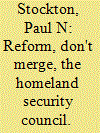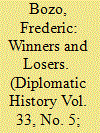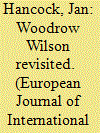|
|
|
Sort Order |
|
|
|
Items / Page
|
|
|
|
|
|
|
| Srl | Item |
| 1 |
ID:
094479


|
|
|
|
|
| Publication |
2010.
|
| Summary/Abstract |
After 9/11, U.S. President George W. Bush announced his determination to do whatever was necessary to prevent future terrorist attacks against the United States. Following the lead of several countries that had recently come to similar conclusions after their own bitter experiences -- including India, Israel, Japan, Russia, Spain, and the United Kingdom -- the United States tightened its immigration laws; increased the protection of its borders, ports, and infrastructure; criminalized providing "material support" for terrorist groups; and tore down the wall between the intelligence agencies and law enforcement agencies, which had crippled counterterrorist efforts for decades. Washington did not authorize preventive detention, as other countries had, but it used other measures to hold persons against whom criminal charges could not be brought -- thereby preventing terrorist attacks. The U.S. government also led or joined various international efforts aimed at warding off new dangers, such as the Proliferation Security Initiative, through which over 70 states cooperate to interdict the movement of nuclear materials across international borders.
|
|
|
|
|
|
|
|
|
|
|
|
|
|
|
|
| 2 |
ID:
099898


|
|
|
|
|
| Publication |
2010.
|
| Summary/Abstract |
This article argues that American policy towards Iraq went through four major shifts between the invasion in 2003 and the announcement of the surge in 2007. The best way to understand the Bush administration's evolving policy towards Iraq is by examining the ideological parameters within which it was made. The article assesses various approaches to understanding the relationship between ideology, policy making and foreign policy, concluding that ideology shapes the paradigm and analytical categories within which foreign policy is made. A major change in foreign policy originates either from the decision-maker consciously recognizing and attempting to rework the ideational parameters within which policy is made or in reaction to 'discrepant information' or 'anomalies' that destabilize the paradigm and its analytical categories. The article goes on to examine the extent to which both neo-liberalism and neo-conservatism shaped George W. Bush's foreign policy. It identifies a series of major analytical categories that originate from within these two doctrines and shaped policy towards Iraq. The article argues that the four major shifts in Bush's policy towards Iraq were forced upon the administration by the rising tide of politically motivated violence. Ultimately this violence forced Bush to abandon the major analytical categories that, up to 2007, had given his policy coherence. In order to extricate his administration from the quagmire that Iraq had become by 2006, Bush totally transformed his approach, dropping the previously dominant neo-liberal paradigm and adopting a counter-insurgency doctrine.
|
|
|
|
|
|
|
|
|
|
|
|
|
|
|
|
| 3 |
ID:
092324


|
|
|
|
|
| Publication |
2009.
|
| Summary/Abstract |
The changing geographical foci of the geopolitical code of the United States are examined by a content analysis of the presidential State of the Union Speeches between 1988 and 2008, the last year of President Reagan's term through the presidency of George W. Bush. The State of the Union speeches are interpreted as geopolitical discourse within a structural setting, using seven foreign-policy paradigms as an organising framework. The empirical findings illustrate an increase over time in the number of regions and countries mentioned in the speeches. Also, notable differences between administrations in terms of their advocacy of globalist or regionalist policies and emphasis upon allies or adversaries are found.
|
|
|
|
|
|
|
|
|
|
|
|
|
|
|
|
| 4 |
ID:
086341


|
|
|
|
|
| Publication |
2009.
|
| Summary/Abstract |
A growing number of scholars argue that the new administration should overturn a key decision made by President George W. Bush: his creation in 2002 of a Homeland Security Council (HSC). Until the September 11, 2001 attacks, the National Security Council (NSC) coordinated the handful of institutions (including the Department of Defense (DOD)) that protected the United States from its adversaries. Bush responded to Al Qaeda's attacks by organizing a sprawling parallel system of institutions to protect the United States from terrorism. The Department of Homeland Security (DHS) is only part of that system. The Bush administration also assigned terrorism prevention functions to the Departments of Agriculture (USDA), Health and Human Services, Interior, and other federal institutions which had never before played such significant roles in securing the United States from attack. Bush capped this parallel security system with the HSC to help guide and coordinate its activities.
|
|
|
|
|
|
|
|
|
|
|
|
|
|
|
|
| 5 |
ID:
096374


|
|
|
|
|
| Publication |
2010.
|
| Summary/Abstract |
Current circumstances might seem to present real opportunities for Congress to reassert itself relative to its weakened role during George W. Bush's presidency. Large, unusually cohesive Democratic majorities in both chambers; unified government; and an administration staffed with people who know Congress well-all this might lead one to expect a productive working relationship permitting Congress wide scope of action. Nevertheless, the Senate's internal deliberative processes threaten to create difficulties so significant that they may outweigh these developments. Looking to the future of Congress, changes in Senate procedures and practices are important not only because of their effects on the institution's internal power structure. Left unchecked, they are also likely to have implications for the balance of power between the executive and legislative branches of government.
|
|
|
|
|
|
|
|
|
|
|
|
|
|
|
|
| 6 |
ID:
091284


|
|
|
|
|
| Publication |
2009.
|
| Summary/Abstract |
In July 1990, a troubled Hubert Védrine, François Mitterrand's strategic adviser and spokesman, wrote to Zbigniew Brzezinski. He was frustrated with an interview that the former U.S. national security adviser under Jimmy Carter had given to a leading French daily newspaper a few days before. In the interview (Moscow had just given its final green light to German unification by accepting that Germany would remain a full North Atlantic Treaty Organization (NATO) member), Brzezinski, a widely respected pundit, had declared that "for many years, we have known that the end of the Cold War would make two winners: the United States and Germany, and two losers: the Soviet Union and France."1 Responding to what in his eyes was a "debatable" viewpoint "to say the least," Védrine argued that France, since General de Gaulle in the 1960s and under Mitterrand throughout the 1980s, had in fact made persistent efforts to overcome the Cold War and its consequences. Denying that its policies had been premised on the enduring division of Germany, he emphasized that "the German unification process had unfolded in accordance with what the French President had wished as early as July 1989." In any case, Védrine concluded, it made no sense to designate victors and vanquished in the Cold War.
|
|
|
|
|
|
|
|
|
|
|
|
|
|
|
|
| 7 |
ID:
095321


|
|
|
|
|
| Publication |
2010.
|
| Summary/Abstract |
The George W. Bush Administrations presented foreign policy in terms of universal liberal values, including human rights. This has led to a number of scholastic comparisons being drawn with the foreign policy of Woodrow Wilson. This article seeks to contribute to this debate by identifying and accounting for three internal rules common to the human rights discourse expressed by the Wilson and Bush Administrations. Bush is argued to indeed be an inheritor of the Wilsonian legacy but not because the Administrations were characterized by the naive advocacy of idealistic values. Instead, human rights have been discursively co-opted by both Presidents as a technique of governance in the sense of producing reality by insisting on one specific interpretation of identities and intents.
|
|
|
|
|
|
|
|
|
|
|
|
|
|
|
|
|
|
|
|
|